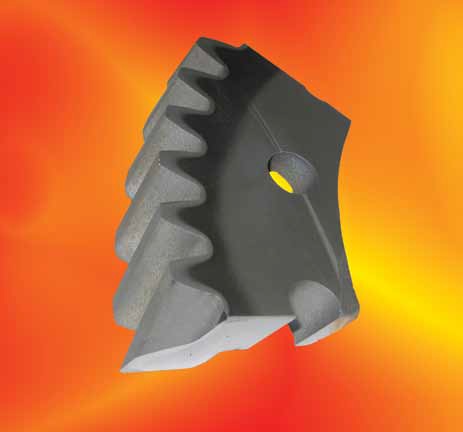ERS Engineering Corp. presents Through Surface Hardening (TSH) technology- a unique metallurgy and process that make it possible to replace carburizing with induction hardening for a wide range of complexly shaped components, including parts previously thought to be unsuitable for induction hardening.
As Mr. Brayman, the President of ERS Engineering Corp. says, “The implementation of this technology provides a unique opportunity to the manufacturers who produce case hardened components to achieve two major goals: first, to substantially reduce the production cost; and second, to significantly improve the quality of produced components.”
TSH technology is an advanced induction hardening process that was specifically developed to reduce the overall product cost and replace thermo-chemical heat-treatment processes, such as carburizing, carbonitriding, nitriding or furnace direct hardening. In contrast to conventional induction hardening processes, thanks to TSH technology, the coil power requirement is dramatically reduced, since it does not demand having short heat times, nor does it require formation of a traditionally needed contour like an austenite surface layer prior to quenching. Low hardenability of TSH steels assures obtaining such patterns, permitting the use of lower power and lower frequency inverters.
“This technology has been utilized in Eastern Europe for a number of years, with very good results. For instance, when it was applied for manufacturing truck leaf springs we were able to reduce the leaf spring weight by almost 40% and at the same time improve the product durability in such a way that we almost killed the aftermarket! This part is unbreakable! Another example is journal crosses that have been produced with this technology for almost 20 years, providing huge savings in product cost and again with improved quality,” Mr. Brayman says. “The results are absolutely astonishing,” he exclaims. TSH is well suited for induction surface hardening of helical bull gears, spiral bevel gears, crown wheel style hypoid gears, helical side gears and other gears and gear-like components. Applicability of the TSH technology is not limited to gears. Bushings, transmission shafts, kingpins, ball joints, driveshafts and differential crosses, and bearing are also good candidates.
Components heat treated utilizing TSH technology have superior metallurgical structures. They are stronger and more durable than parts made from conventionally heat-treated standard steels. TSH is a cost-effective technology that is lean, green and allows for individual traceability.
TSH technology is a synergistic combination of low hardenability advanced (LH) steels and superior induction hardening techniques. TSH steels can be substituted for more expensive standard steels, typically used for conventional induction hardening or carburizing. TSH steels are characterized by a reduced tendency for grain growth during gear heating to the hardening temperature range, and they have significantly fewer alloying elements, such as manganese, molybdenum, chromium and nickel, making them less expensive than the majority of conventional steels. Their chemical composition and process specifics provide for formation of fine grain martensite with extremely high compressive stresses on the tooth surface and across the case depth. Various applications may call for slightly different steel chemical compositions and process recipes.
“Throughout ERS Engineering Corp. journey to implement this technology on the North American market, the major stumbling block has been the lack of low hardenability steel. Now the situation has changed. We have already produced the required steel on a commercial basis, with very good results. And today there are steel producers ready to supply this steel to the potential manufacturers of this type of product,” Mr. Brayman says.
“Our company has all the necessary experience and resources. ERS Engineering Corp. has a number of patents and owns intellectual property rights for this technology in North America. We bear total application responsibility starting from steel production throughout the entire manufacturing process to finished parts with better prices and greater quality,” Mr. Brayman says, “I strongly recommend that all case hardening component manufacturers find out more about all the advantages and benefits that this technology can offer their companies.”

